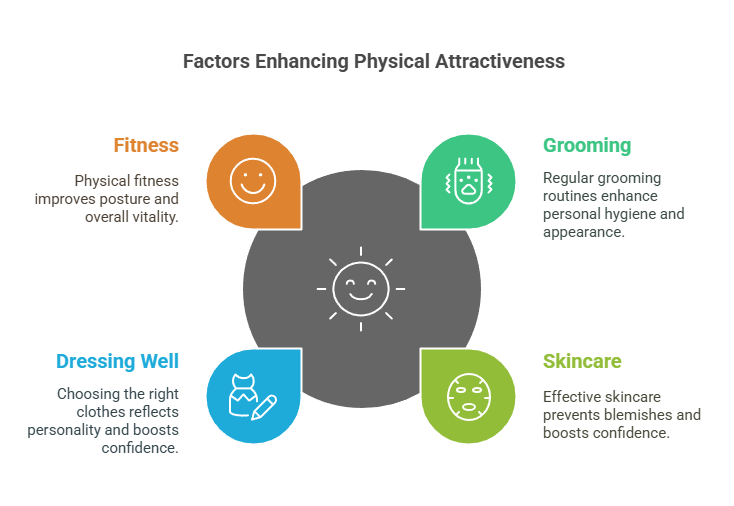Attractiveness is beyond only physical appearance – it encompasses the ways in which you carry yourself, how you feel, and in what way you communicate with others.
Whether you are on a quest to become more self-assured, get along better with people, or make yourself look more pleasing, this all-in-one guide has a wealth of specific ways and valuable insights for you.
From understanding the science of attraction through effective communication, we will present to you all the essential information to enrich your life.
Then, the only thing you have to do is to unlock your hidden potential.
Physical Attractiveness
Physical attractiveness is frequently the very first element that people might notice, and it indeed contributes to forming a good first impression.
Although your same genes also have some influence, a lot of your physical attractiveness is still in your hands.
This statement implies that if you focus on grooming, dressing well, and doing regular exercises to maintain a correct posture and fitness, you can considerably improve your attractiveness.
To make the goals achievable, we shall first of all elaborate on it by giving some steps.
Grooming and Personal Hygiene
Good grooming and personal hygiene are the foundation of physical attractiveness. They not only improve your appearance but also boost your confidence and leave a positive impression on others.
Daily Grooming Routine
A consistent daily grooming routine is essential for maintaining a polished and attractive appearance. Here’s a simple yet effective routine to follow:
- Haircare: Keep your hair clean, trimmed, and styled in a way that suits your face shape. Whether you prefer a sleek look or a more casual style, well-maintained hair is a key component of attractiveness.
- Skincare: Cleanse, moisturize, and protect your skin daily. Use products suited to your skin type to avoid issues like acne or dryness.
- Facial Hair: If you have facial hair, keep it well-groomed. Whether it’s a clean shave or a neatly trimmed beard, facial hair should look intentional and tidy.
- Oral Hygiene: Brush and floss twice a day, and consider using mouthwash to maintain fresh breath. A bright smile is one of the most attractive features you can have.
- Nails: Keep your nails clean and trimmed. Dirty or overgrown nails can be a major turn-off.
Importance of Skincare
Healthy, glowing skin is a universal sign of attractiveness. Skincare isn’t just for women—men can benefit greatly from a simple routine too. Here’s why skincare matters:
- Prevents Acne and Blemishes: Regular cleansing helps remove dirt and oil that can clog pores and cause breakouts.
- Delays Aging: Moisturizing and using sunscreen can prevent premature wrinkles and sun damage.
- Boosts Confidence: Clear skin can make you feel more confident in your appearance, which in turn makes you more attractive to others.
- Tips for Better Skin: Drink plenty of water, eat a balanced diet rich in antioxidants, and avoid smoking or excessive alcohol consumption.
Dressing for Success
Your clothing choices are a direct reflection of your personality and can significantly impact how others perceive you. Dressing well doesn’t mean wearing expensive clothes—it’s about wearing the right clothes for the right occasion and ensuring they fit well.
Finding Your Style
Your personal style should reflect who you are while also making you feel confident. Here’s how to find it:
- Experiment: Try different styles, colors, and patterns to see what resonates with you.
- Seek Inspiration: Look to fashion icons, social media, or magazines for ideas, but adapt them to suit your personality.
- Invest in Basics: Build a wardrobe with timeless pieces like a well-fitted blazer, white shirt, dark jeans, and quality shoes. These can be mixed and matched for various occasions.
- Dress for the Occasion: Tailor your outfit to the setting—whether it’s casual, professional, or formal.
Dressing for Your Body Type
Understanding your body type and dressing accordingly can make a world of difference. Here’s how to do it:
- For Slim Builds: Opt for fitted clothing that adds structure, like tailored jackets or slim-fit pants. Layering can also add dimension.
- For Athletic Builds: Highlight your physique with well-fitted shirts and avoid overly baggy clothes.
- For Heavier Builds: Choose darker colors and vertical stripes to create a slimming effect. Avoid tight clothing and opt for pieces that drape well.
- For Petite Frames: Avoid oversized clothing and opt for vertical lines or monochromatic outfits to create the illusion of height.
Fitness and Body Language
Physical fitness and body language are powerful tools for enhancing attractiveness. They not only improve your appearance but also convey confidence and vitality.
H4: Importance of Posture
Good posture is one of the simplest yet most effective ways to appear more attractive. Here’s why it matters:
- Confidence: Standing tall with your shoulders back and head held high exudes confidence.
- Health Benefits: Good posture reduces strain on your muscles and joints, preventing pain and fatigue.
- First Impressions: People are more likely to perceive you as approachable and self-assured if you have good posture.
- Tips for Better Posture: Practice standing against a wall to align your spine, and engage your core muscles to maintain an upright position.
Emotional and Mental Attractiveness
While physical appearance may catch someone’s eye, emotional and mental attractiveness are what truly captivate and sustain interest.
These qualities are rooted in how you perceive yourself, how you manage your emotions, and how you connect with others.
Let’s explore how to build confidence and develop emotional intelligence to become more emotionally and mentally attractive.
Building Confidence
Confidence is one of the most attractive traits a person can possess. It radiates through your actions, words, and demeanor, making you more appealing to others. However, confidence isn’t something you’re born with—it’s something you can cultivate.
Overcoming Insecurities
Everyone has insecurities, but letting them control you can hinder your attractiveness. Here’s how to overcome them:
- Identify Your Insecurities: Acknowledge what makes you feel self-conscious. Is it your appearance, skills, or social abilities?
- Challenge Negative Thoughts: Replace self-doubt with positive affirmations. For example, instead of thinking, “I’m not good enough,” remind yourself, “I am capable and worthy.”
- Focus on Strengths: Shift your attention to what you excel at. Celebrate your achievements, no matter how small.
- Seek Support: Talk to friends, family, or a therapist about your insecurities. Sometimes, an outside perspective can help you see things more clearly.
- Take Action: Work on areas you want to improve. If you’re insecure about your public speaking skills, join a Toastmasters club or practice in front of a mirror.
Positive Self-Talk
The way you talk to yourself has a profound impact on your confidence and attractiveness. Positive self-talk can help you build a healthier self-image.
- Be Kind to Yourself: Treat yourself with the same compassion you’d show a friend. Avoid harsh self-criticism.
- Use Affirmations: Start your day with positive statements like, “I am confident,” “I am capable,” or “I deserve happiness.”
- Reframe Negative Thoughts: When a negative thought arises, reframe it. For example, change “I failed” to “I learned something valuable.”
- Practice Gratitude: Focus on what you’re grateful for. Gratitude shifts your mindset from lack to abundance, boosting your confidence.
Developing Emotional Intelligence
Emotional intelligence (EQ) is the ability to understand, manage, and express your emotions while also recognizing and responding to the emotions of others. High EQ is a hallmark of emotionally attractive individuals.
Understanding and Managing Emotions
Being in tune with your emotions is the first step toward emotional intelligence. Here’s how to improve:
- Identify Your Emotions: Take time to recognize what you’re feeling. Are you angry, sad, anxious, or excited? Naming your emotions helps you understand them better.
- Pause Before Reacting: When emotions run high, take a moment to breathe and think before responding. This prevents impulsive reactions you might regret later.
- Develop Healthy Coping Mechanisms: Find constructive ways to manage stress, such as exercise, journaling, or talking to a trusted friend.
- Practice Self-Awareness: Reflect on how your emotions influence your behavior. For example, does stress make you irritable? Recognizing these patterns helps you manage them better.
Empathy and Social Skills
Empathy—the ability to understand and share the feelings of others—is a cornerstone of emotional intelligence.
Combined with strong social skills, it makes you more relatable and attractive.
- Listen Actively: Pay full attention when someone is speaking. Avoid interrupting, and show that you’re engaged by nodding or asking follow-up questions.
- Validate Others’ Feelings: Acknowledge and validate the emotions of others, even if you don’t agree with their perspective. For example, say, “I understand why you’d feel that way.”
- Be Genuine: Authenticity is key to building trust and connection. Be yourself, and don’t try to impress others by pretending to be someone you’re not.
- Practice Conflict Resolution: Learn to handle disagreements calmly and respectfully. Focus on finding solutions rather than assigning blame.
- Show Appreciation: Express gratitude and appreciation for the people in your life. A simple “thank you” or “I appreciate you” can go a long way.
Emotional and mental attractiveness are about how you make others feel.
By cultivating confidence, emotional intelligence, and empathy, you’ll not only become more attractive but also create deeper, more fulfilling relationships.
Remember, true attractiveness comes from within—it’s about being the best version of yourself, both for you and for those around you.




